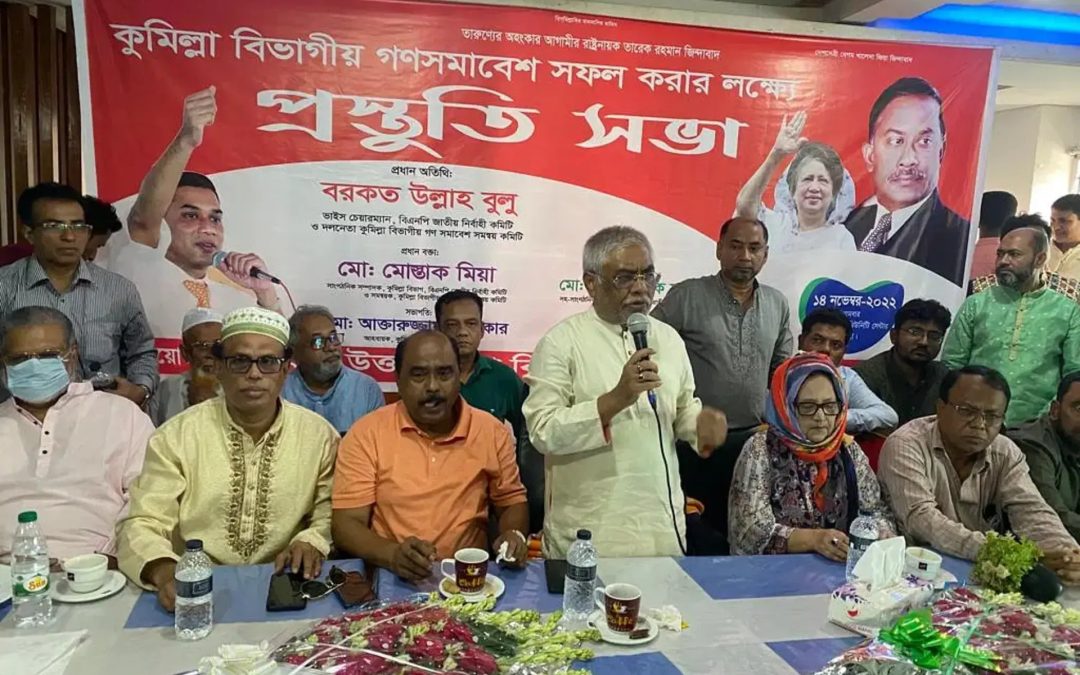The Departmental Mass Assembly of BNP will take place in the Comilla Town Hall on November 26. The Comilla North District BNP scheduled a meeting in a neighboring hotel on Monday afternoon in order to get ready for this event|Photo: Prothom Alo
A Nation Held Hostage by Political Strife
Bangladesh, a land of hope and resilience, finds itself entangled in a web of political turmoil. Citizens are grappling with rising prices, restrictive governance, and the suffocating absence of freedom.
The opposition voices, led by the Bangladesh Nationalist Party (BNP), accuse the ruling Awami League of creating an environment that feels like a vast prison for its people. As political leaders lock horns, the nation stands at a crossroads.
What lies ahead for a country yearning for justice and stability?
A Government Criticized: “The Nation Feels Like a Prison”
Barkatullah Bulu, Vice Chairman of the BNP Central Committee, minced no words in condemning the Awami League government.
Speaking at a preparatory meeting in Comilla for the BNP’s November 26 divisional mass rally, he likened the country under Sheikh Hasina’s leadership to a prison.
Bulu specifically highlighted the house arrest of BNP Chairperson Khaleda Zia as symbolic of broader oppression.
In addition to political repression, economic woes dominate the lives of ordinary citizens. With the skyrocketing cost of goods, survival has become increasingly challenging.
According to Bulu, the BNP’s protests are not just political acts but a cry for the people’s relief. The government’s attempts to suppress these voices, he argued, reflect its growing fear of losing public support.
Rising Opposition Momentum: Comilla as a Symbol of Defiance
Comilla has long been a stronghold of BNP support, and its leaders are determined to use this momentum.
During the meeting, leaders like Akhtaruzzaman Sarkar, the convener of Comilla North District BNP, emphasized the importance of unity among party members to counter the government’s anticipated obstacles.
They urged their supporters to overcome barriers and gather at the town hall on November 26, promising a massive turnout that would serve as a referendum against the ruling party.
BNP organizing secretary Mostak Mia and other prominent leaders, including Shaheda Rafique and Khandaker Maruf Hossain, echoed similar sentiments.
They stressed that the rally would not only showcase the party’s strength but also reflect the growing dissatisfaction of ordinary citizens with the Awami League’s policies.
An Uneasy Governance: The Need for Change
The discontent is not limited to the opposition; the people of Bangladesh are increasingly voicing their frustration.
Barkatullah Bulu argued that no one feels secure under the current regime, accusing it of prioritizing power over public welfare. The BNP leaders at the Comilla meeting demanded Sheikh Hasina’s resignation, asserting that her departure was the only way to restore democracy and public trust.
Despite significant challenges, the BNP leaders remain hopeful, with Comilla serving as a litmus test for their movement’s strength.
The party’s efforts to mobilize supporters underscore its determination to bring about political change and hold the government accountable for its alleged missteps.
Verdict: Time for Unity and Action
As Bangladesh stands on the brink of political transformation, its people must decide their future.
Will they endure the current state of oppression and economic hardship, or will they rise to demand accountability and justice?
The call for change rings loud across the nation, echoing in the streets, markets, and rally grounds of Comilla.
The BNP’s rally is more than a political event; it is a symbol of hope for those who believe in the power of unity and resistance.
The journey ahead will not be easy, but the resilience of the Bangladeshi people has always been their greatest strength. Together, they can pave the way for a brighter, freer, and more equitable future.

